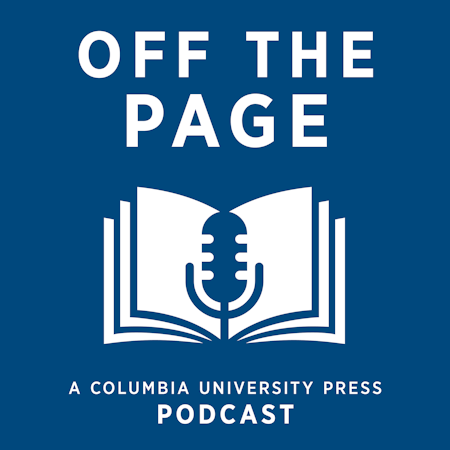
Off the Page: A Columbia University P...
Interviews with Columbia University Press authors.
351
Perin Gürel, "The Limits of Westernization: A C...
In a 2001 poll, Turks ranked the United States highest when asked: "Which country is Turkey's best friend in international relations?"
34 min
352
Geoffrey Barstow, "Food of Sinful Demons: Meat,...
Barstow explores the tension between Buddhist ethics and Tibetan cultural norms to offer a novel perspective on the spiritual and social dimensions of meat eating...
62 min
353
Andrew Sidman, "Pork Barrel Politics: How Gover...
Sidman offers a systematic explanation for how political polarization relates to the electoral influence of federal spending...
20 min
354
Elizabeth Herbin-Triant, "Race, Class, and Camp...
Threatening Property examines the campaigns for residential segregation in early-20th century North Carolina...
35 min
355
Zahra Ayubi, "Gendered Morality: Classical Isla...
How are notions of justice and equality constructed in Islamic virtue ethics (akhlaq)?
64 min
356
Elizabeth S. Kassab, "Enlightenment on the Eve ...
Kassab shows her readers that the demands for human dignity, freedom, and political participation had been robustly discussed by intellectuals in Syria and Egypt during the 1990s and 2000s...
56 min
357
Max Oidtmann, "Forging the Golden Urn: The Qing...
Why would the Chinese Communist Party revive this former ritual? What powers lie in the symbolism of the “Golden Urn”?
72 min
358
Donna Dickenson, "Me Medicine vs. We Medicine: ...
Personalized healthcare―or what the award-winning author Donna Dickenson calls "Me Medicine"―is radically transforming our longstanding "one-size-fits-all" model...
20 min
359
Shennette Garrett-Scott, "Banking on Freedom: B...
Think running an insurance company or a bank is hard? Try doing it as an African-American woman in the Jim Crow South...
39 min
360
Patton E. Burchett, "A Genealogy of Devotion: B...
Burchett re-examines what we assume about the rise of devotionalism in North India, tracing its flowering since India’s early medieval “Tantric Age” to present day...
59 min
361
Tsering Döndrup, "The Handsome Monk and Other S...
Christopher Peacock, with a contribution from Lauran Hartley, masterfully introduces the work of contemporary Tibetan author Tsering Döndrup...
74 min
362
Kerim Yasar, "Electrified Voices: How the Telep...
Kerim Yasar argues that modern technologies of sound reproduction and transmission have had profound—and often underappreciated—social, economic, and political effects...
89 min
363
Matthew W. King, "Ocean of Milk, Ocean of Blood...
Matthew W. King tells the story of Zawa Damdin, one Mongolian monk’s efforts to defend Buddhist monasticism in revolutionary times, revealing an unexplored landscape of countermodern Buddhisms beyond old imperial formations and the newly invented national subject...
61 min
364
Christina Yi, "Colonizing Language: Cultural Pr...
The fact that Korea’s experience of Japanese imperialism plays a role in present-day Japan-Korea relations is no secret to anyone
59 min
365
Wendy Pearlman and Boaz Atzili, "Triadic Coerci...
In the post–Cold War era, states increasingly find themselves in conflicts with nonstate actors...
56 min
366
Jill Stauffer, "Ethical Loneliness: The Injusti...
Jill Stauffer argues that survivors of unjust treatment and dehumanization can experience further harm when individuals and institutions will not or cannot hear the survivors’ claims...
59 min
367
I. Gould Ellen and J. Steil, "The Dream Revisit...
Why do people live where they do? What explains the persistence of residential segregation?
56 min
368
Jamieson Webster, "Conversion Disorder: Listeni...
Entering into psychoanalysis takes courage, for patients and analysts alike...
41 min
369
Margaret Hennefeld, "Specters of Slapstick and ...
In the early days of film, female comedians appeared in films that included both strange activities and slapstick....
67 min
370
Alexandre Kojève, "Atheism," trans by Jeff Love...
Ranging across Heidegger, Buddhism, Christianity, German idealism, Russian literature, and mathematics, Kojève advances a novel argument about freedom and authority...
75 min
371
Thomas Patton, "The Buddha’s Wizards: Magic, Pr...
Thomas Patton examines the weizzā, a figure in Burmese Buddhism who is possessed with extraordinary supernatural powers, usually gained through some sort of esoteric practice...
67 min
372
Perrin Selcer, "The Postwar Origins of the Glob...
Having been born into a world in which people knew about anthropogenic global warming, I grew up in the “global environment.”
63 min
373
Howard Chiang, "After Eunuchs: Science, Medicin...
Howard Chiang’s new book is a masterful study of the relationship between sexual knowledge and Chinese modernity...
66 min
374
Arlene M. Sánchez Walsh, “Pentecostals in Ameri...
Arlene M. Sánchez Walsh‘s Pentecostals in America (Columbia University Press, 2018) offers a critical look at the history, key figures, and ideas that make Pentecostalism unique and challenges the narrative gloss offered by its adherents and church his...
60 min
375
Sandra Fahy, “Marching Through Suffering: Loss ...
Amidst an atmosphere of hope on the Korean Peninsula over the past year, questions over the wellbeing of North Korea’s population have again come to global attention. But this is far from the first time that such a subject has been in the news,
57 min